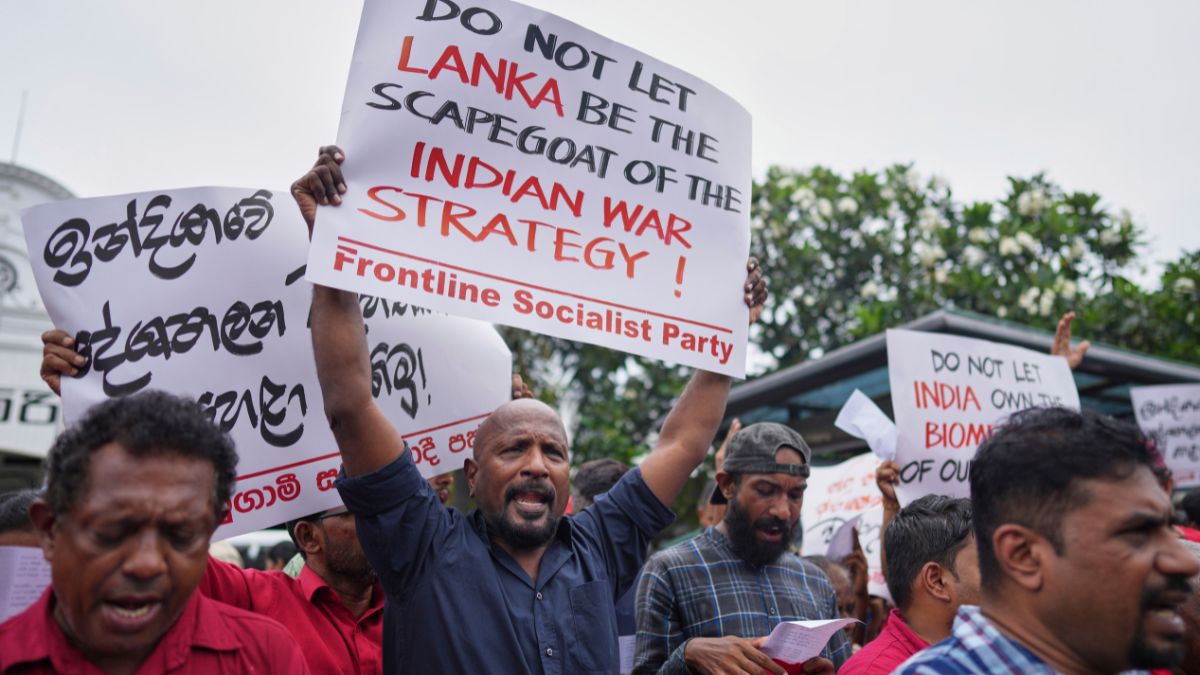'Modi probably wants control of our ports, oil tank farms': Protest in Sri Lanka over signing of defence MoUs
 Members of the Frontline Socialist Party shout anti Indian slogans during Indian Prime Minister Narendra Modi's Sri Lankan state visit in Colombo | AP
Members of the Frontline Socialist Party shout anti Indian slogans during Indian Prime Minister Narendra Modi's Sri Lankan state visit in Colombo | AP
As Prime Minister Narendra Modi signs an ambitious defence cooperation pact with Sri Lanka, Colombo has clarified that all activities undertaken under the proposed MoU will follow the domestic laws of Sri Lanka.
Sri Lanka's Defence Secretary Sampath Thuyacontha told reporters that "any cooperation activities undertaken under the proposed MoU will be in accordance with international best practices and will not conflict with the domestic laws and national policies of either Sri Lanka or India".
This came as fringe parties, including the Front Line Socialist Party (FLSP) which is a breakaway group of the ruling Janatha Vimukthi Peramuna (JJVP), took out a protest march, shouting anti-Indian slogans.
FLSP Chief Secretary Kumar Gunaratnam, who once served in the politburo of JVP, questioned India's intentions in Sri Lanka, stating PM Modi's visit could create grave issues in the country. "The cabinet spokesman has said Mr Modi will visit the Jaya Sri Maha Bodhi and will make a donation to Mannar Hospital. What does the Indian Prime Minister Modi expect through these activities? Probably he wants control of Sri Lankan ports and oil tank farms in Trincomalee. India has engaged in such an exercise for some time," Gunaratnam was quoted by Daily Mirror on Saturday.
He said India, the US and China are embroiled in a tussle to dominate the Indian Ocean region and Sri Lanka would be unnecessarily involved in geopolitics if it goes ahead with the proposed defence pact. Gunaratnam also called the pact a historic mistake.
However, Thuyacontha sought to allay fears, stating that the agreements were "meticulously scrutinised and reviewed".
"Relevant negotiations were conducted in terms of circular instructions issued by the Secretary to the President in January this year concerning interactions with foreign governments. The approval of the Cabinet of Ministers was duly obtained prior to signature," he added.
He said both parties vowed to respect the national and military laws in the countries and the relevant principles and purposes of the Charter of the United Nations, which include the sovereign equality of States, territorial integrity and inviolability, and non-intervention in the internal affairs of the parties.
Interestingly, the defence pact comes nearly four decades after the Indian Peace Keeping Force intervened in the island nation, a move that had political implications for both countries.
World